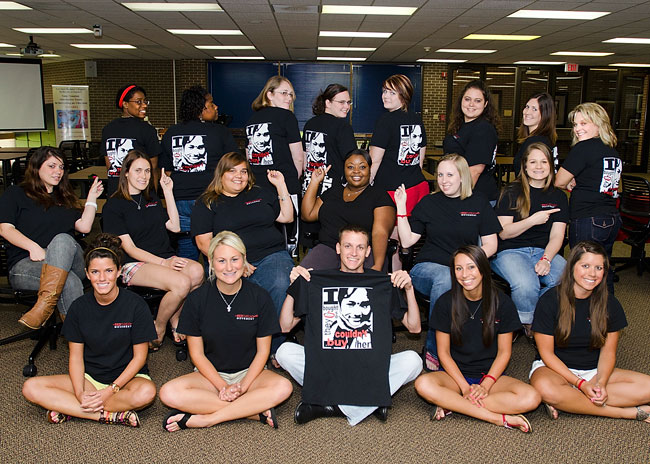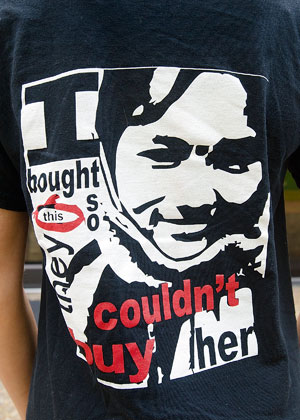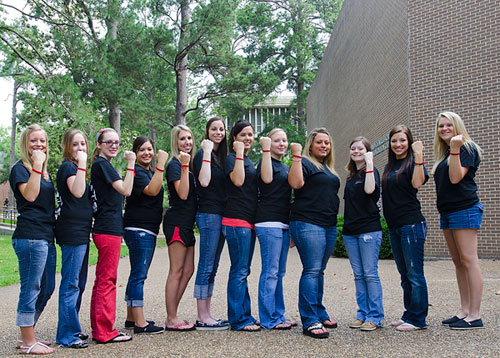Students Spread Local Awareness Of Global Issue
May 4, 2012
SHSU Media Contact: Sara Thompson
 |
| Education students in SHSU's Social Studies Methods class display a T-shirt which served as one of the items they sold in an effort to raise local awareness of human sex trafficking. Proceeds from their sales will go directly to Nepal to help support safehouses for rescued victims. —Photos by Brian Blalock |
 Not many threads unwind a story like those contained in each Red Thread bracelet.
Not many threads unwind a story like those contained in each Red Thread bracelet.
Hand woven in Nepal by women and girls who were rescued from sex trafficking, the bracelets are made to raise awareness of the crime throughout every city in the nation.
As this spring semester comes to a close, two groups of Sam Houston State University seniors are now able to say they have successfully checked one city off that list.
The students have spent the past four months doing their part to intertwine their fellow students, professors and Huntsville neighbors with the global issue.
The movement spread to SHSU through the efforts of assistant professor of education Karla Eidson and the students of her "Social Studies Methods" course.
Each semester, Eidson proposes social issues to her students to serve as the emphasis of their research and work throughout the course. After learning about the issue of sex trafficking over her winter break, she knew it would be the perfect topic for her class this spring.
Sex trafficking is a worldwide criminal enterprise, seen especially in third-world countries where women and young girls are coerced to leave their homes and villages and then placed into underground prostitution markets. These kidnapped victims are often forced to work within large cities in America and rest of the world, where they can seamlessly blend in to a diverse pool of citizens.
The Red Thread Movement concentrates a large amount of their efforts in Nepal where the problem is significantly prevalent. There, women’s low social status and insufficient education make them vulnerable targets for traffickers, according to Eidson.
“Many of my classes are composed mainly of females, so I knew they would be able to deeply relate with the cause in that way,” Eidson said.
It was only halfway through the first class and two documentary videos later that her prediction came true, she said.
For SHSU senior Christie Samayoa, seeing the video accounts of survivors and their stories was a jaw-dropping moment.
“Hearing that these other women are experiencing things like this all over the world moves you and horrifies you at the same time,” she said.
According to Eidson, her students were fast and eager to take action.
Throughout the spring semester her classes not only sold the Red Thread bracelets to other members of the SHSU community, they also designed a shirt to be sold for proceeds as well.
The shirt’s message was both short and powerful reading “I bought this so you couldn’t buy her” beside the picture of a Nepalese sex trafficking survivor. Selling these items was “their own contribution” to stand behind Red Thread Movement advocates, according to Samoaya.
By speaking to various organizations inside the SHSU and local communities, the two classes have blanketed the town of Huntsville with the bracelets and successfully spread awareness of the cause.
It’s a big accomplishment that they know will make an even greater impact, said Samoaya.
The same can be said for the remainder of the nation. With bracelets being sold in all areas of the country, the simple hand-woven bracelets are becoming more powerful by the day.
According to Eidson, by wearing a Red Thread bracelet one helps to create public awareness on the thousands of women and children who fall victim to this crime each year.
 The proceeds from each $3 bracelet go toward the building and continuation of “border units” along the Nepal and India border. These establishments rescue as many as 100 women and children each month from their captors before they leave the country and are potentially sold into forced labor.
The proceeds from each $3 bracelet go toward the building and continuation of “border units” along the Nepal and India border. These establishments rescue as many as 100 women and children each month from their captors before they leave the country and are potentially sold into forced labor.
“Captors come into their villages pretending to be activists and promise these women a better life for them and their children if they leave Nepal,” said Eidson. “The border units are put in place so that volunteers can stop these women and help them realize they are really being kidnapped.”
These kidnapped victims are typically unable to return immediately because they often suffer from shame or experience social rejection after leaving their village with these male captors. For them, the border units serve as safehouses that provide shelter, counseling, an education and vocational training, according to Eidson.
The women within these units weave the Red Thread bracelets as a simple way to earn a supplemental income to provide for themselves and their families.
The U.S. Department of Justice defines sex trafficking as the recruitment, harboring, transportation, provision, or obtaining of a person for the purposes of commercial sex acts through the use of fraud, force, or coercion, or in which the person forced to perform such acts is under the age of 18.
“So much of our student population comes from Houston and that is one of the nation’s leading hubs for this sort of activity,” said Eidson.
According to the U.S. Department of Justice, one in five of the estimated 14,500-to-17,500 suspected victims of sex trafficking will pass through Houston.
Harris County’s I-10 serves as America’s No. 1 transport for these victims.
“These women and children are brought into the city not speaking any English or having any prior education, so they are forced to comply to sexual slavery just to save themselves from starvation,” said Eidson.
In 2009, the Red Thread Movement was founded at Abilene Christian University by sophomore political science major Brittany Partridge.
She became motivated to “create a change” after a mission trip to the safehouses of rescued sex traffic victims in Romania.
Within three years, the movement has spread to more than 70 university campuses and is sponsored by more than 180 musicians.
In 2011, the Red Thread Movement was featured on CNN International for the station’s worldwide Freedom Project.
- END -
This page maintained by SHSU's Communications Office
Associate Director: Julia May
Manager: Jennifer Gauntt
Located in the 115 Administration Building
Telephone: 936.294.1836; Fax: 936.294.1834
Please send comments, corrections, news tips to Today@Sam.edu.

 SamWeb
SamWeb My Sam
My Sam E-mail
E-mail

